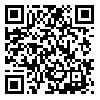Volume 15, Issue 3 (May-June 2016)
Payesh 2016, 15(3): 241-250 |
Back to browse issues page
Download citation:
BibTeX | RIS | EndNote | Medlars | ProCite | Reference Manager | RefWorks
Send citation to:



BibTeX | RIS | EndNote | Medlars | ProCite | Reference Manager | RefWorks
Send citation to:
Rozita Khanali, Mahdi Najafi, Gholam Reza Sarami, Roya Khanali, Ali Montazeri. Translation, cultural adaptation and face validity of the Persian version of Type D personality questionnaire (DS14). Payesh 2016; 15 (3) :241-250
URL: http://payeshjournal.ir/article-1-173-en.html
URL: http://payeshjournal.ir/article-1-173-en.html
1- Nursing Midwifery Faculty, Tehran Medical Science, Islamic Azad University, Tehran, Iran
2- Research department, Tehran Heart Center, Tehran University of Medical Sciences, Tehran, Iran
3- Statistics Department, Kharazmi University, Tehran, Iran
4- American School of Professional Psychology, Argosy University, Washington DC, USA
5- Health Metrics Research Center, Iranian Institutes for Health Sciences Research, ACECR, Tehran, Iran
2- Research department, Tehran Heart Center, Tehran University of Medical Sciences, Tehran, Iran
3- Statistics Department, Kharazmi University, Tehran, Iran
4- American School of Professional Psychology, Argosy University, Washington DC, USA
5- Health Metrics Research Center, Iranian Institutes for Health Sciences Research, ACECR, Tehran, Iran
Abstract: (6204 Views)
Objective (s): There is evidence that there is a link between coronary disease and hypertension as the result of increased psychological and mental distress. As such it is argued that Type D personality might be a risk factor for coronary heart disease. In addition Type D personality is associated with poor outcome in patients with coronary heart disease. The purpose of this study was to conduct a cultural and linguistic adaptation and comparison, as well as a Persian translation of the questionnaire in order to provide an appropriate and useful instrument for assessing type D personality in patients with coronary heart disease.
Methods: This study is a part of the Non-Physical Determinants of Outcome: type D Personality, Depression, Downturn in energy, and coping with emotional Distress (NPHYDO 4D) study. In order to make an assessment of type D personality, we used Type D Personality (DS14) questionnaire. This questionnaire was translated using Brislin translation method.
Results: Type D personality (DS14) was translated into Persian using two groups of 30 bilingual individuals, and was used for evaluating in 200 patients who were candidates for open heart surgery in the Tehran Heart Center. Type D personality questionnaire is consisted of two personality stable traits: social inhibition and negative affect. The results indicated that the questions related to social inhibition characteristic were more unclear and ambiguous than those related to negative emotions. Question 3 “I often talk to strangers”, 6” I often feel inhibited in social interactions”, 7” I take gloomy view of things”, 9” I am often in a bad mood”, and 11” I would rather keep other people at a distance”, had lesser conceptual power in translation process.
Conclusion: The findings suggest that Persian version of type D personality questionnaire is an appropriate assessment tool that can be used in clinical settings. However, it should be used cautiously.
Methods: This study is a part of the Non-Physical Determinants of Outcome: type D Personality, Depression, Downturn in energy, and coping with emotional Distress (NPHYDO 4D) study. In order to make an assessment of type D personality, we used Type D Personality (DS14) questionnaire. This questionnaire was translated using Brislin translation method.
Results: Type D personality (DS14) was translated into Persian using two groups of 30 bilingual individuals, and was used for evaluating in 200 patients who were candidates for open heart surgery in the Tehran Heart Center. Type D personality questionnaire is consisted of two personality stable traits: social inhibition and negative affect. The results indicated that the questions related to social inhibition characteristic were more unclear and ambiguous than those related to negative emotions. Question 3 “I often talk to strangers”, 6” I often feel inhibited in social interactions”, 7” I take gloomy view of things”, 9” I am often in a bad mood”, and 11” I would rather keep other people at a distance”, had lesser conceptual power in translation process.
Conclusion: The findings suggest that Persian version of type D personality questionnaire is an appropriate assessment tool that can be used in clinical settings. However, it should be used cautiously.
Keywords: Personality Type D, coronary artery disease, Brislin method of translation, cultural adaptation
type of study: Descriptive |
Accepted: 2016/04/10 | ePublished ahead of print: 2016/04/17 | Published: 2016/05/15
Accepted: 2016/04/10 | ePublished ahead of print: 2016/04/17 | Published: 2016/05/15
| Rights and Permissions | |
 |
This work is licensed under a Creative Commons Attribution-NonCommercial 4.0 International License. |





